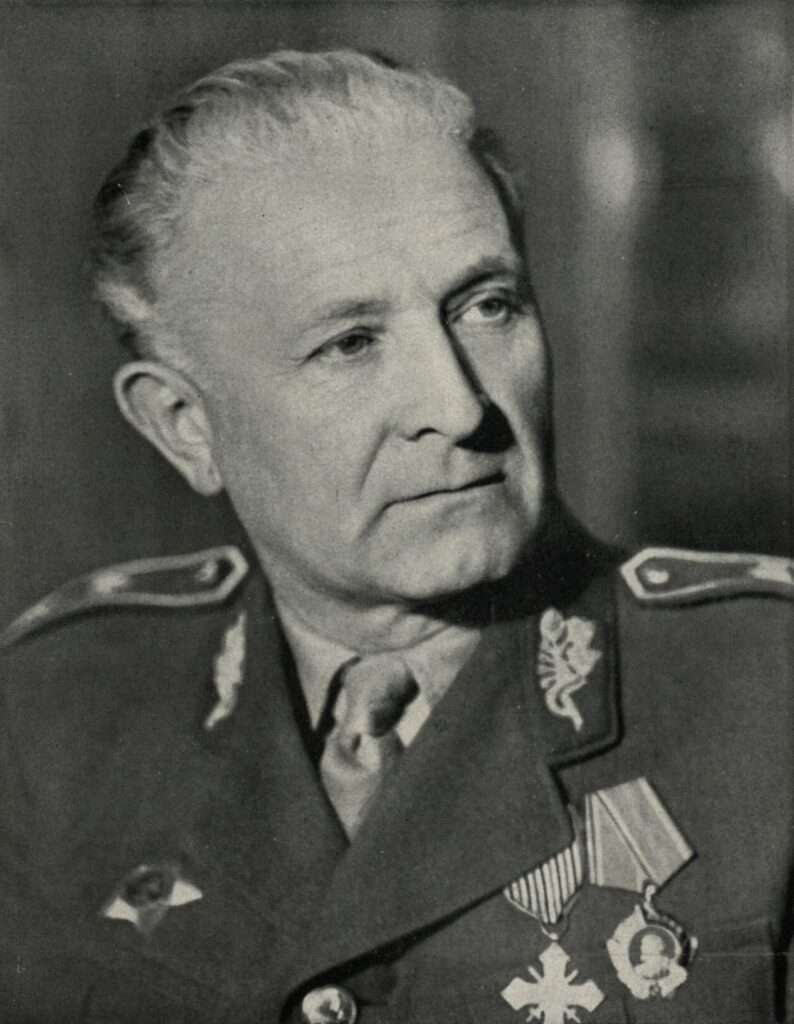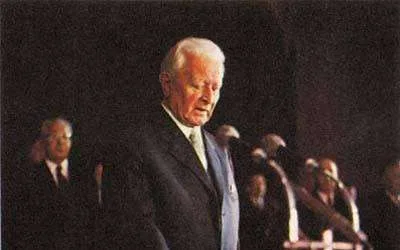Yesterday was the 45th anniversary of the death of Army General Ludvík Svoboda, a hero of both World Wars and the seventh Czechoslovak President.
He was born on 25 November 1895 in Hroznatín in the Bohemian-Moravian Highlands as the third child of Jan Svoboda, a farmer, and his wife Františka, née Chalupová. His father died when Ludvík was barely a year old and he grew up in a large family with an older brother and sister and three half-siblings from his mother's second marriage. He received an agronomic education at the Provincial Agricultural School in Velké Meziříčí, which he supplemented with an apprenticeship in winemaking in Austria. In 1915 he and his brother Josef were conscripted into the Austro-Hungarian army, the elder Josef was sent to the Serbian front, from where he unfortunately never returned, Ludvík was sent to the East, where the first chapters of his military career began to be written. In the same year, he voluntarily surrendered to Russian captivity at Tarnopol, then joined the fire brigade of Kiev, where he received professional training, and in August 1916 he joined the Czechoslovak Legion. He fought in the battles of Zborov, Bachmach and took part in the fighting for the Siberian Main Line. He returned to his homeland as a hero of the Great War with one of the last ship transports across Japan, the Pacific Ocean, the Panama Canal and the USA in September 1920 with the rank of captain. He was awarded the Military Cross of World War I.
Because his mother lost her second husband, he took over the family farm, but soon handed it over to his half-brother and from 1921 served in the 3rd Infantry Regiment of Jan Žižka in Kroměříž. Big changes came in 1923, when in June he married his girlfriend Irena Stratilova, daughter of a miller from Cvrčovice, in Velehrad, and was sent to Subcarpathian Russia as a machine-gun company commander. The town of Uzhhorod then became a new home for the Svobodas for eight years, and soon they had two children, a son Miroslav and a daughter Zoe. As there were many Hungarians among Svoboda's subordinates, he learned Hungarian and then taught Hungarian at the Military Academy in Hranice from 1931 to 1934. In 1934 he returned to Kroměříž with his family and in September 1938 he became commander of an infantry battalion. After the signing of the Munich Agreement and the occupation of the republic, Svoboda became involved in the organisation of the military resistance organisation Defence of the Nation in the Kroměříž region. At the beginning of June 1939, he crossed illegally to Poland and began to form a military unit in Kraków from refugees from Czechoslovakia. After Germany attacked Poland, Svoboda ordered a retreat to Soviet territory and was himself interned by the Red Army. After the German attack on the USSR in 1941, he received permission to form a Czechoslovak military unit in the USSR and in January 1942 was appointed deputy commander of the 1st Czechoslovak Independent Infantry Battalion in Buzuluk.
His actions during the Second World War are admirable and publicly known, so we will mention them only briefly. From the formation of the unit in Buzuluk, through the memorable battle of Sokolov and the liberation of Kiev, the Czechoslovaks achieved on the Eastern Front, with the considerable contribution of Ludvík Svoboda, the formation of the 1st Czechoslovak Army Corps in the spring of 1944. General Jan Kratochvíl became the corps commander at first, and in the autumn of 1944 Svoboda took command of the corps by order of Marshal Konev. The corps distinguished itself in the Carpatho-Dukla Operation - the largest mountain operation of World War II and the largest operation of the Czechoslovak Army. Army in its history. The Army Corps liberated Slovakia and Eastern Moravia. In early April 1945, President Edvard Beneš appointed the so-called Košice Government and Ludvík Svoboda, as a non-party member, became Minister of National Defence (after Jan Masaryk). General Karel Klapálek took over the command of the army corps. In August 1945 Svoboda was promoted to army general, in 1946 he was awarded the Order of the White Lion for Victory and the Order of the SNP, later he received the Gold Star of the Hero of the Czechoslovakia and the USSR (1965) and many other awards. His wife Irena also joined the resistance during the war. After his departure to Poland, she cooperated with the Defence of the Nation, helped the families of arrested patriots and hid paratroopers in her house in Kroměříž. As the Gestapo became interested in her after the paratroopers were arrested, she and her daughter hid in the Bohemian-Moravian Highlands until the end of the war. Her mother, two brothers and son Miroslav were arrested and all died in a concentration camp.
Ludvík Svoboda, as Minister of Defence, was instrumental in ensuring the continued involvement of women in the Czechoslovak Army. Svoboda played a significant role in 1948, when he assured President Beneš that the army would not go against the people under any circumstances. In 1948 he also joined the Communist Party of Czechoslovakia and was elected to the National Assembly of the Czechoslovak Republic, serving as a deputy until 1968. Because of his views on the building of the army, he was accused of "political unreliability" in 1951, removed from government posts and dismissed from the army; he was even detained and investigated by the StB in the autumn of 1952 and officially retired in January 1953. At that time he returned to Hroznatín, where he helped build an agricultural cooperative. In 1954, N. S. Khrushchev met him during his visit to Czechoslovakia. Svoboda was then offered the post of head of the Military Academy of Command Direction in Prague. From there he retired in 1959, but he did not slack off. In 1960 he published his memoirs From Buzuluk to Prague and in 1971 his book Paths of Life, and was actively involved in social activities. He was vice-chairman of the Union of Anti-Fascist Fighters and the Union of Czechoslovak-Soviet Friendship and worked at the Military Historical Institute.
On 30 March 1968, during the so-called Prague Spring, General Svoboda was elected President of the Republic after the abdication of Antonín Novotný. This was at the suggestion of the new Chief Secretary of the Central Committee of the Communist Party of Czechoslovakia, Alexander Dubček, who relied on the recommendation of the Union of Anti-Fascist Fighters. Svoboda was the first president to be elected by secret ballot and not by acclamation, receiving 282 votes out of 288. He was re-elected in March 1973, but due to health problems (he suffered a stroke and pulmonary embolism), his term was prematurely terminated by a newly adopted constitutional law in 1975. He lived the rest of his life with his wife in their villa in Břevnov, Prague. He died on 20 September 1979 after a series of strokes; his wife survived him by less than a year. Thousands of people accompanied General Svoboda on his last journey. His urn was placed in the National Memorial in Vítkov and in 1993 it was transferred to the Svoboda family tomb in the cemetery in Kroměříž.

gnews.cz-Jana Černá
PHOTO - wikimedia.org



